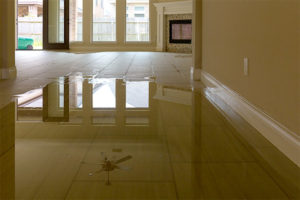Preparing Your Home For Storms To Prevent Flood Damage
 Severe weather can come quickly and without warning, and can also bring a flood following it. Heavy rains may cause excess rain to collect in bodies of water and overflow. This amount of rainfall can also be heavy enough that the ground cannot absorb it all quickly enough, causing a flood in your yard. This flood can leak into the basement, possibly damaging possessions and the home’s foundation as well.
Severe weather can come quickly and without warning, and can also bring a flood following it. Heavy rains may cause excess rain to collect in bodies of water and overflow. This amount of rainfall can also be heavy enough that the ground cannot absorb it all quickly enough, causing a flood in your yard. This flood can leak into the basement, possibly damaging possessions and the home’s foundation as well.
Water Damage Restoration In Tuscaloosa
It’s important that you know the best steps to prepare for a storm in order to prevent water from entering your home and causing damage. There are several ways to manage stormwater runoff and prevent damage.
1. Check The Gutters
The gutters are there to help manage water during a storm, steering it off your roof and away from your home. If these gutters and downspouts are clogged, this preventative measure is stopped. They will need to be cleaned out often. Depending on the foliage around your home, you could clean it anywhere between every three months to twice a year. If you have not cleaned them in a while, do so before a storm hits.
Besides checking if they are clear from debris, it is also essential to ensure that the downspouts are steered away from the foundation of the home. Though the gutters may take them away from the roof, the downspouts need to take the water away from the home. They need to be pointed away from the house and also cleared of debris so they can bring the water in the correct direction.
2. Seal Any Leaks
To ensure that no water makes it into the home, go around your home and guarantee that every crack or hole is filled. One missed hole can lead to a leak in the home, which can cause water damage that may not be discovered until irreparable damage has been done. In downspouts and gutters, they can be sealed with a waterproof sealant. In your home, you can check windows, doors, and the roof. Windows will need to be re-caulked if necessary. You will need good door draft stoppers as well to stop both wind and rain from coming indoors. Inspect the roof as well to see if there needs to be any patching done to prevent leaks. Additionally, look for cracks or holes in the foundation. If you find anything, fill these in completely with concrete patching.
3. Install A Sump Pump
A sump pump can be a great option for flood control, especially if floods are a threat in your area. This device is essentially one that moves any water that may collect in your basement to the outside of your home. It is a pump that is installed in a shallow pit; once the pit becomes full of water, the pump will push it out through tubing outdoors. Having one in your home is an incredible backup if the basement does end up flooding. Not only can this device be useful if your home is prone to flooding, but also if there is excess moisture in the basement that can damage the foundation of your home. It’s important to know your home’s needs to determine the best type of sump pump.
When Should I Call A Professional?
It’s important to know when to call a professional. Though there are several preventative measures that can be done on your own, there are some things that are better left to professionals. If any project seems difficult or uncomfortable to undertake, a licensed professional can help out, such as Restoration 1 in Tuscaloosa. Keeping your home water damage free is important, especially when done correctly and safely.
